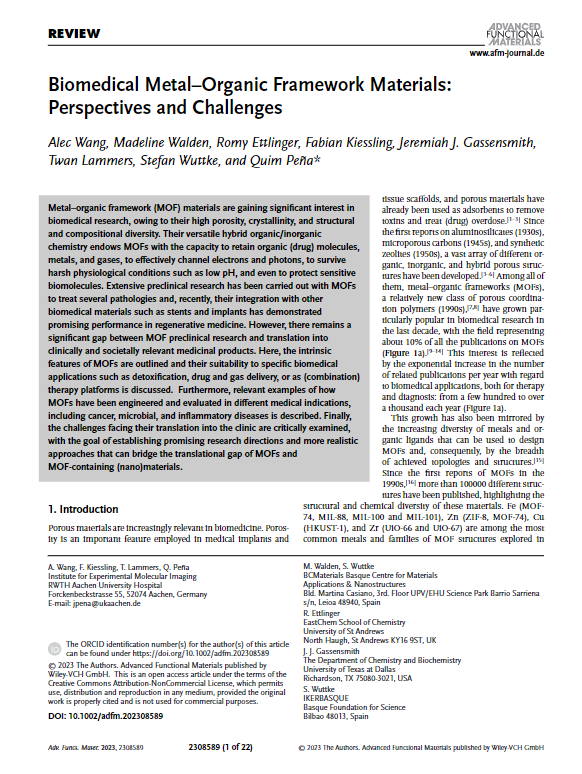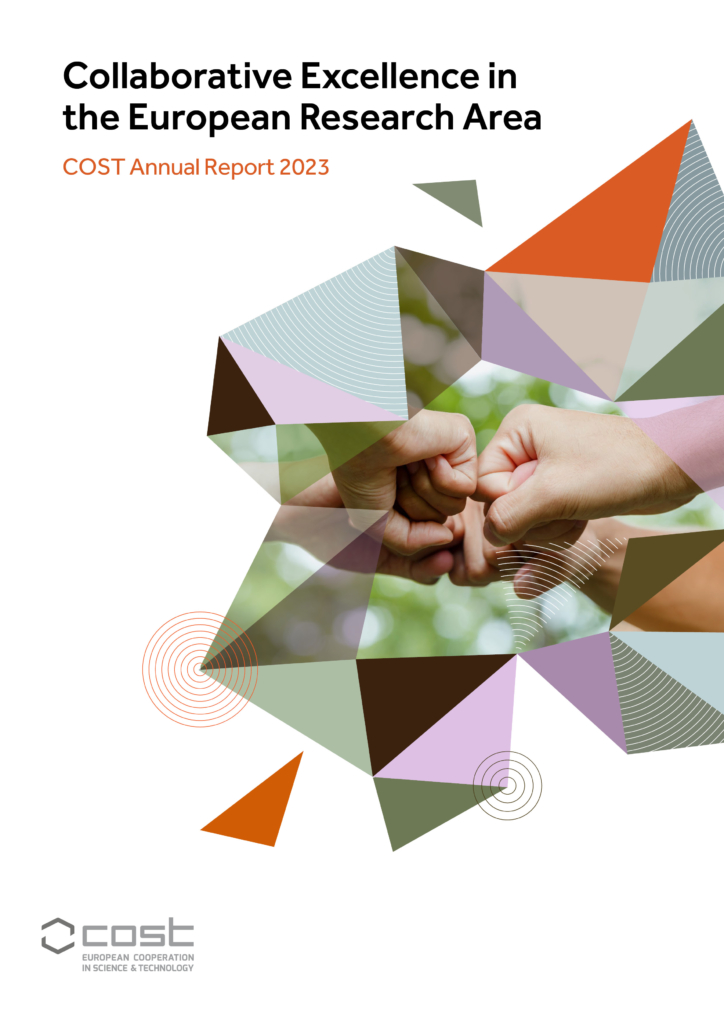
Biomedical Metal–Organic Framework Materials: Perspectives and Challenges
https://doi.org/10.1002/adfm.202308589
Metal–organic framework (MOF) materials have attracted a lot of attention for their potential biomedical applications. They offer unprecedented porosity, tunability, and versatile metal-organic chemistry that can enable novel therapeutic approaches in different indications such as cancer (immuno-)therapy, inflammation, regenerative medicine, and infectious diseases. However, this wealth of preclinical investigation has not translated effectively into the clinic. In this review, we take a translational perspective in analyzing MOF chemistry and the features of MOF (nano-)materials for different biomedical applications. We also assess the remaining barriers to clinical translation of MOFs and critically discuss possible approaches towards realistically bridging the translational gap and, ultimately, generating clinical impact.

COST Annual Report 2023
COST exists to guide and strengthen collaboration between researchers and innovators to meet the scientific challenges of our time. The COST Annual Report 2023 puts collaboration at it’s heart to show how we support the European Research Area.
This edition depicts 2023’s main highlights, together with key facts and figures from the year. It also features numerous success stories about COST Actions and testimonials from the researchers involved.

COST FP10 Position Paper
Preparations for the 10th EU Framework Programme for Research and Innovation, known as FP10, are underway. Discover why the European Research Area and FP10 need COST.

How to monitor raptors
This section of the ERBfacility Action Advice Hub gives a concise guide to monitoring a range of contextual parameters in raptors, with a focus on those that are (a) most useful for interpretation of pan-European contaminant studies and (b) most feasible to record by many researchers across Europe.

Media Literacy and Assistive Technologies for Empowerment in Autism
ISBN 978-972-54-0983-1
DOI 10.24140/asdigital.v1
Recognising the unique challenges and opportunities faced by people on the autism spectrum in navigating the complex world of media, the ASDigital and a-STEP COST Action (CA19104) have brought together a group of academics, professionals and people on the autism spectrum to develop short, user-friendly approaches that reflect on the existing evidence on the challenges and promise of this relationship.
The primary objective of this book titled “Media Literacy and Assistive Technologies for Empowerment in Autism” is to examine and shed light on the aforementioned dynamics. It aims to provide valuable perspectives on how media literacy and assistive technology can enhance the capabilities of individuals with autism, enabling them to flourish in the era of digital advancements.
Promoting more media literacy initiatives including individuals in the autism spectrum could provide them the tools to navigate an ever-evolving digital landscape with confidence and competence (Ressa, 2022). Therefore, in the first part of this book, called “Autism, Diversity, and Media Literacy”, six chapters are presented, to explore the different intersections between the fields of media literacy, media education, diversity, and autism.
Taking into consideration that Assistive Technologies (AT) show great promise in supporting people with diverse abilities and expertise, including people with Autism Spectrum Disorder (ASD) and Intellectual Disability (ID), and that intuitive, inclusive design and proper implementation of AT can foster confidence and self-sufficiency to truly empower and socially include individuals across the ASD and ID spectra. The second half of this book, entitled “Assistive Technologies, Empowerment, and Inclusion”, has as its main goal to delve into a broad range of assistive technologies at the nexus of empowerment and inclusion.

CLIMATE CHANGE: BATS AND THEIR CONSERVATION
Climate change has wide-ranging adverse effects on wildlife and the essential ecosystem services they provide. Bats are a diverse and widely distributed group that make up about a fifth of all the native mammal species in Europe. All but one of our 45 species are insect-eaters, and they play a vital role in regulating insect populations. Despite their vulnerability to climate change, bats have received relatively little attention compared to other animal groups.

Growing ideas through networks
The COST corporate publication ‘Growing ideas through networks’ explains the COST programme and COST Actions, including how they work, who they are for and how to propose or join an Action.

Join our European research networks
View all running COST Actions and learn how you can participate.

Participatory Research on Child Maltreatment with Children and Adult Survivors
ISBN: 978-1-80455-529-3 (Print)
ISBN: 978-1-80455-526-2 (Online)
ISBN: 978-1-80455-528-6 (Epub)
Concepts, Ethics, and Methods
Childhood should be free of violence, and victims of childhood
maltreatment should be entitled to participate as expert informants in
research about these experiences. Placing children and adult survivors
at the heart of research efforts on child maltreatment is critical to
effective response and prevention measures in fighting this form of
violence.
Embedded in the European context, Participatory Research on Child
Maltreatment with Children and Adult Survivors presents a mosaic of
contexts, theories, and methods relating to children’s and adult
survivors’ participation in research about their adverse experiences.
Contributors demonstrate how research can mobilize children and
adult survivors to become agents in constructing and disseminating
reliable, evidence-based knowledge about child maltreatment.
Enriching ongoing debates about ethical concerns and challenges of
participatory research in the field of child maltreatment, this
contribution to Emerald Studies in Child Centred Practice highlights the
advantages that participation as a human right and as a valued
endeavour of scientific knowledge accumulation can bring to
communities of researchers and helping professionals.
